Question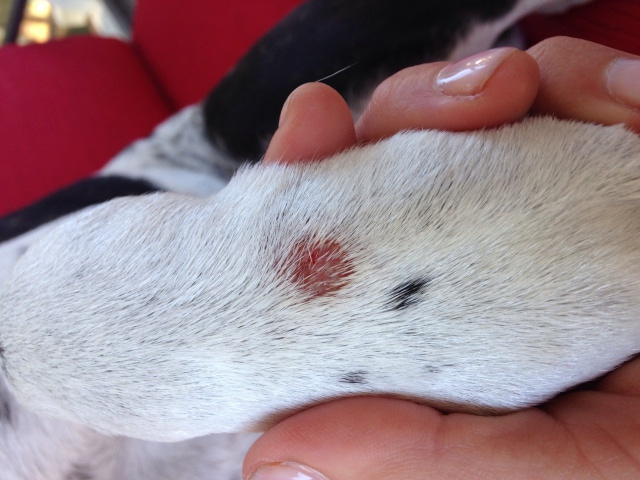 Granuloma
Granuloma
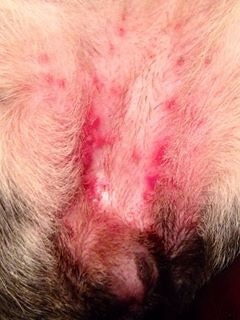 Staph
Staph
QUESTION: Hello! I will try to be brief and give a quick history. Lana is a 6 year old American Bulldog mix. This past year she repeatedly developed staph infections that antibiotics plus prednisone would subside but would rid. She has now been on Atopica for three months- no staph!! This is the longest she's been in over a year! Recently, she has started to shed very very VERY badly and her skin smells like metal. Her diet hAsnt changed (grain free Blue Buffalo). And I've noticed her obsessive licking has come back- to the point of Acral lick granulomas on her left front paw. I guess my question is, is this shedding and metallic smell a side effect of Atopica? Or is there another underlying factor? Or maybe the Atopica isn't working? She started at 150mg per day and is now at 100mg per day. I hate seeing her so miserable- it's like she's always uncomfortable and there's nothing I can do about it!!
Any insight would be greatly appreciated!
I have pictures of the staph at different stages and this granuloma if that helps?
Thanks!!
Brantley
ANSWER: Was she on the higher dose for around 6 weeks or so? It may be that you need to go back up to the higher dose. Are you giving it on an empty stomach?
Is it spring where you are at the moment? Often the change of season leads to increased allergens, so she may be reacting to that, in which case going back onto the higher dose Atopica might be enough to get things under control. What often complicates things is that when the allergy starts up and the skin is inflammed and itchy, often they get secondary infections (staph usually), which makes them even more itchy, so as well as the Atopica she might need another course of antibiotics.
Your vet might be best to advise you on what to do, as I'm not sure the full details. Your vet might want to check for a fungal infection or mites as well.
Hope your girl gets some relief soon, can be very frustrating having an allergic dog, as often there is not a complete cure, even with an excellent medication like Atopica.
Eloise
www.lovethatpet.com
---------- FOLLOW-UP ----------
QUESTION: She was on the higher round for 8 weeks. It is currently fall here- if you can call it that! I live in Charleston SC, USA. It's not often we have 4 distinct seasons. Haha. My understanding for her going on Atopica was to finally get her off so many rounds of antibiotics? Is this not correct? I was taking her to a vet in the city who repeatedly put her on the same medicine and I saw no relief. Finally taking her back to my old school vet, he put her on Keflex for a month then started her on the Atopica. This plan finally seemed to work without seeing the staph return. When I read online about Atopica, I see all of these horror stories. I realize how immunosuppressants work- I just want what's best for my girl! I rescued her from a horrible situation and it's been just the two of us ever since. She's my family.
Also, she's an inside dog and I'm a clean freak! Could it be the new house we are in has carpet and allergens there have her aggravated?
Thanks for your insight and speedy response! I am at ease hearing from a professional rather than reading countless articles online!!
Good day to you,
Brantley
Answerhi there,
So did the itching stop on the higher dose of Atopica then return when you dropped the dose? The idea is that you suppress the allergy response, then switch them to every other day treatment and keep them on a lower dose. It does not always work, but is certainly safer than prednisone, which has greater side effects.
Has she had a food trial? Many dogs have multiple allergies and food may be a part of the picture.
Generally allergies can be in 4 categories:
1. contact allergies (common on the feet and underbelly)
2. flea allergies (common around the base of the tail)
3. food allergies (usually feet, ears and generalised itching)
4. atopic dermatitis (allergy to airborne things like dust mites, pollens, insects etc...it kinda covers everything else in the environment they can react to. Similar to hayfever in humans but tends to cause itchy feet, ear infections and generalised itching, same as food allergies).
When dealing with allergies I usually work from most common and easily solved, to the more difficult allergies. So I'll tell you what I would do if I saw you in clinic and perhaps we can work out a plan that will work. Before doing anything I check for infection and/or put the dog on some antibiotics and/or antifungals to clear up the infection, otherwise they will still scratch despite finding the cause of the allergy.
Then we first rule out a flea allergy. Flea allergic dogs don't necessarily have visible fleas, as one flea bite can keep them scratching for up to 2 weeks. To rule out this allergy, use an incredibly fast acting product like Comfortis (allergic dogs can scratch from a single flea bite for up to 2 weeks). What do you currently use for fleas?
If the allergy involves licking feet and the underside of the body in particular I would check for wandering jew (at least in Sydney this groundcover is usually the culprit) and keep Lana off the grass for 2 weeks to see if the itching subsides.
Once we have ruled out contact allergies and flea allergies, the next one is food. She would need to go on a special diet for 8 weeks. You can either home cook using a protein she has never had before, combined with a carbohydrate like sweet potato or use Hills Science diet Z/D.
So the idea is to rule out the allergies for which we can remove the cause. So flea, contact and food allergies theoretically can be solved by removing the allergen.
Usually once we have got to the point of ruling out all of these, Atopica is used for atopic dermatitis. Your vet might have ruled out the other causes of allergies in a different way, or by looking at distribution or history, so take what I say on how I do it with a grain of salt! Unfortunately even on the Atopica, some dogs can occasionally need courses of antibiotics, as you don't necessarily ever cure allergies, they are just kept under control.
The other thing that you can do is do a blood test for allergens, details are here: https://www.heska.com/Products/ALLERCEPT/ALLERCEPT.aspx
Based on this you can do a series of allergy 'shots', to desensitise the immune system. Usually a course of allergy shots cost around $1200 in Australia and works in 70% of dogs. This I believe would differ based on location. We see lots of allergic dogs in Sydney, just due to our climate here.
Did you just move house when the allergy started up again? Did the old place have carpets? Dust mite allergies are often related to carpets and furnishings and can be challenging to solve.
Some more questions so I can help you more:
What sort of shampoo are you using?
How often do you bathe her?
Where does she lick/scratch? Ears, base of tail? feet?
Is the skin currently very pink, thickened and moist?
I have written a handout here on allergies that might help.
http://www.dogster.com/lifestyle/dog-health-tips-combat-seasonal-allergies-in-do
Eloise
www.lovethatpet.com



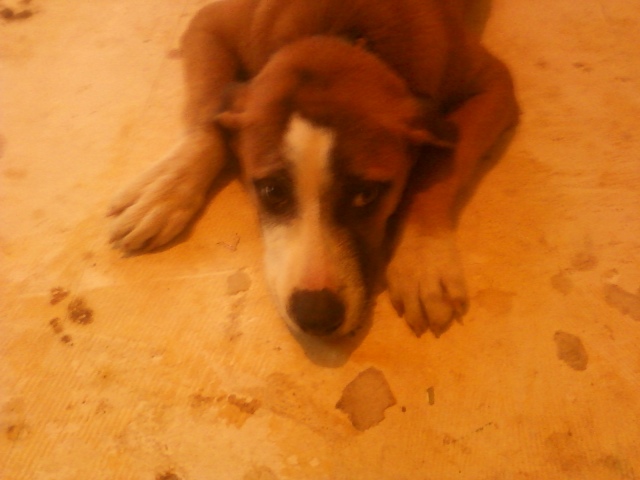 6 month old dog rear legs paralyzed
Question
Teddy
We adopted a lab/st.Bernard mix dog name
6 month old dog rear legs paralyzed
Question
Teddy
We adopted a lab/st.Bernard mix dog name
 My 8 month old Great Pyrenees Pup
QuestionBefore and After
Places on Legs
Q
My 8 month old Great Pyrenees Pup
QuestionBefore and After
Places on Legs
Q
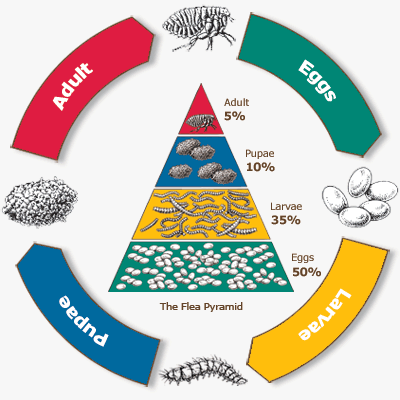 Cat Fleas
QuestionDo you possibly know of any way I can get rid o
Cat Fleas
QuestionDo you possibly know of any way I can get rid o
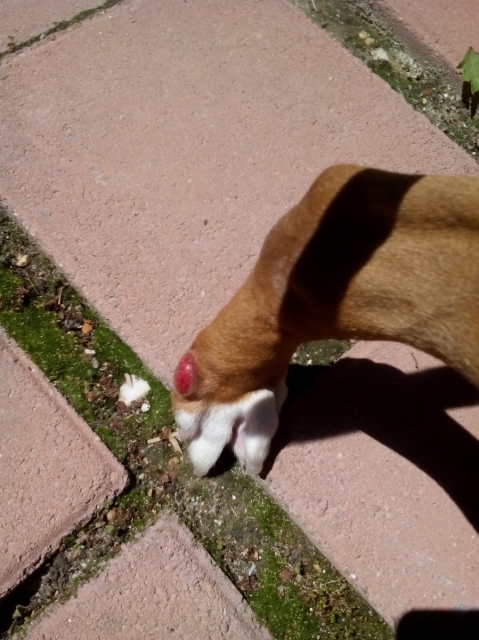 Large boil like bump
Question
back paw
My 2 year old bull mastiff has
Large boil like bump
Question
back paw
My 2 year old bull mastiff has
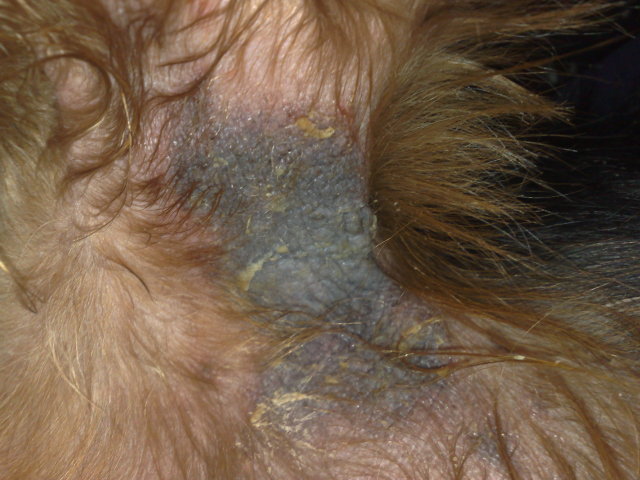 My yorkie has a skin problem
Question
my yorkie
I was wondering if you can help me i
My yorkie has a skin problem
Question
my yorkie
I was wondering if you can help me i